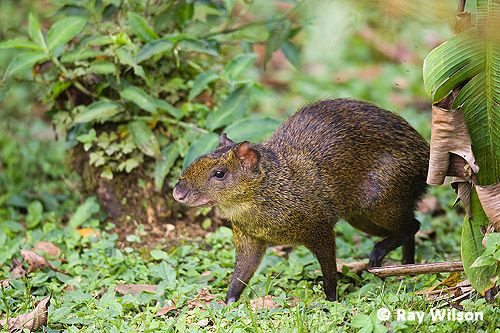
- Home
- Workshops / Tours
- Diary / Blog
- Galleries
- Foreign Trips
- Tasmania 2016
- NE Queensland 2016
- Western Alps 2016
- NE Spain 2016
- Australia's Wet Tropics 2015
- Australia's Top End 2015
- SW Australia 2015
- Switzerland 2015
- Andalucia 2015
- Belize 2015
- Australia 2014
- Switzerland 2014
- Belize 2014
- Bahama Islands 2014
- Switzerland 2013
- Ecuador 2012-2013
- Florida 2011-2012
- Vancouver Island 2011
- Australia 2010
- Peru 2008
- Bulgaria 2007
- Lesvos 2006
- California 2006
- New Zealand 2005
- Extremadura 2005
- Goa, India 2004
- The Gambia 2003
Southern Peru
25th November-14th December 2008
Cock-of-the-Rock Lodge
My stay at the Cock-of-the-Rock Lodge was marred by a viral infection which I must have picked up in Cuzco. I completely lost all my energy and it was an effort to even stay awake during the first day of our 3 night stay, nevermind do anything energetic! As a consequence, we spent almost all of our time watching the birds coming to the feeders from the balcony of the dining room, but since it rained most of the time we were there this was probably the best place to be!
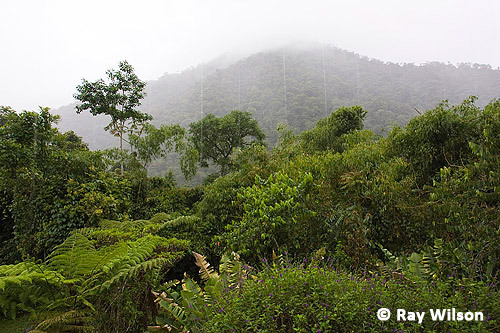
View from the balcony of Cock-of-the-Rock Lodge
There was always a lot of activity around the hummingbird feeders with 6 species being observed over the 2 days.
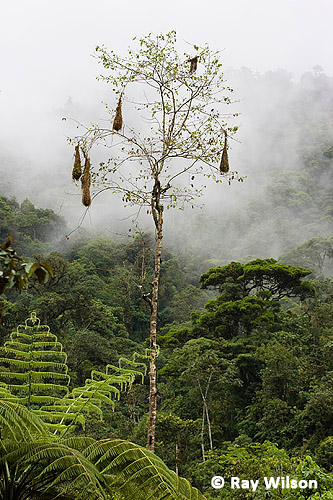
Russet-backed Oropendula nests |
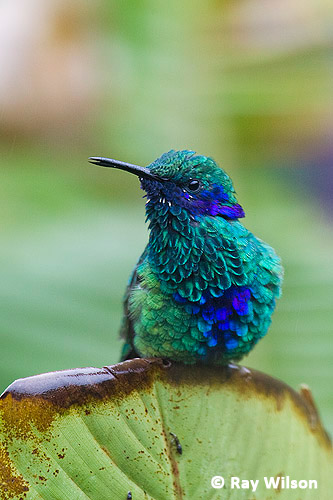
Sparkling Violet-ear |
Sparkling Violetear was by far the most common of the hummingbirds.
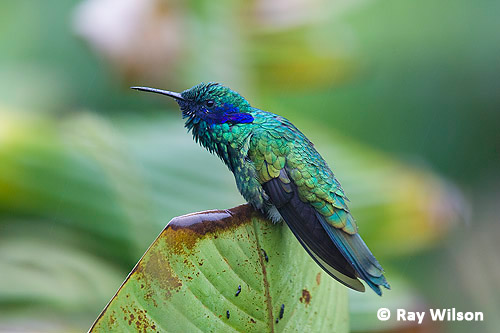
Sparkling Violet-ear (Colibri coruscans)
The rain didn't seem to bother them all that much...
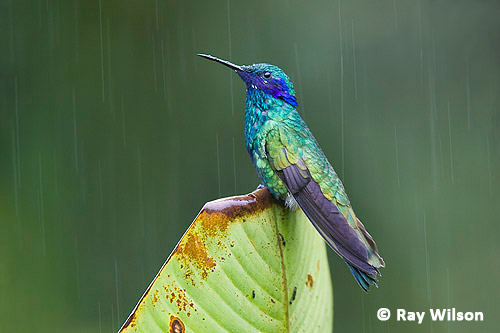
The smaller Many-spotted Hummingbird was also quite numerous around the feeders.
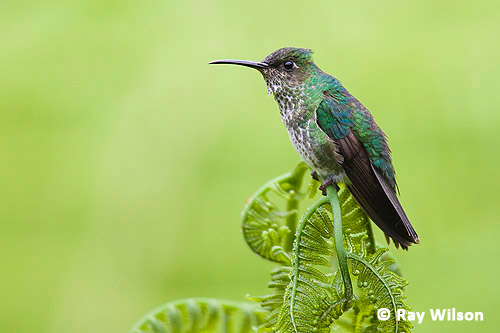
Many-spotted Hummingbird (Colaptes rupicola)
Although Violet-fronted Brilliant was a regular visitor it very rarely perched close to the feeders, prefering to return to the forest after drinking some sugar water.
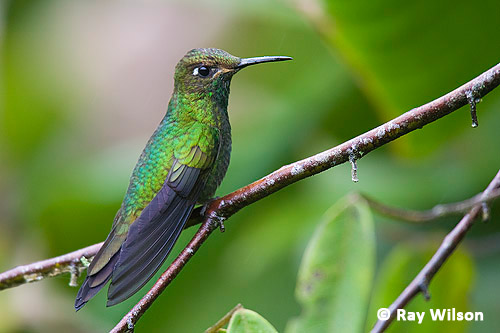
Violet-fronted Brilliant (Heliodoxa leadbeateri)
The tiny, but spectacular Booted Racket-tail, with a body length of only 7cm (excluding bill and tail streamers) was only an occasional visitor.
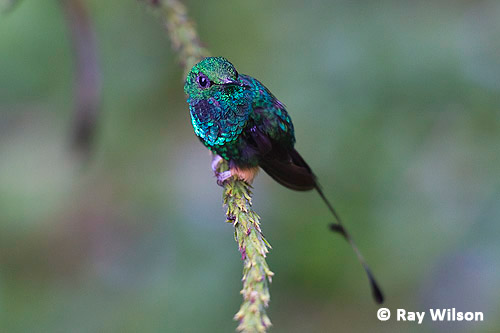
male Booted Racket-tail (Ocreatus underwoodii)
The elongated outer tail feather almost double its length and render the male unmistakable.
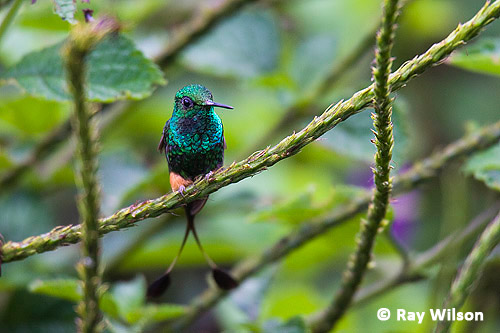
male Booted Racket-tail (Ocreatus underwoodii)
In flight, the Booted Racket-tail is almost insect-like, especially the female which lacks the long tail rackets of the male. Due to the slow shutter speeds in the low light levels produced by the dull, rainy conditions, the rapidly beating wings are practically invisible in this photograph.
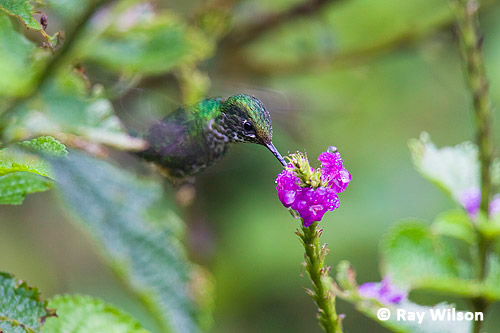
female Booted Racket-tail (Ocreatus underwoodii)
Even smaller and more insect-like is the Wire-crested Thorntail. The female is only 6.5cm (2.5in) long from the tip of its 1.2cm bill to the tip of its tail.
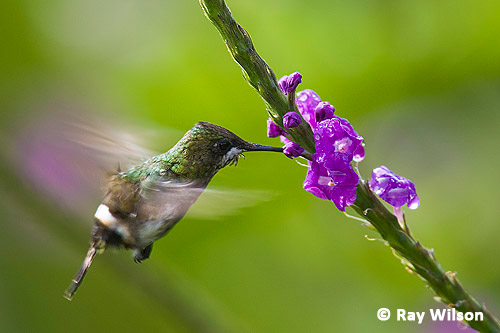
female Wire-crested Thorntail (Discosura popelairii)
Several species of Tanagers are viewable from the balcony, but very few come close enough to photograph. One exception is the Silver-beaked Tanager which was by far the commonest of the Tanagers and foraged around the undergrowth in large groups.
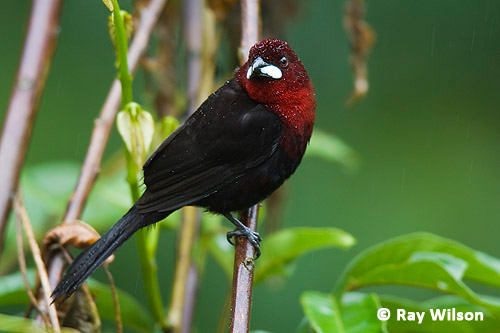
male Silver-beaked Tanager (Ramphocelus carbo)
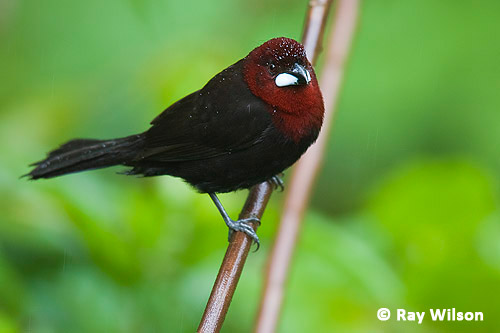
male Silver-beaked Tanager (Ramphocelus carbo)
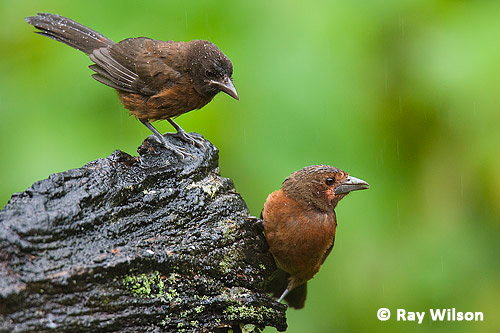
juvenile and female Silver-beaked Tanager (Ramphocelus carbo)
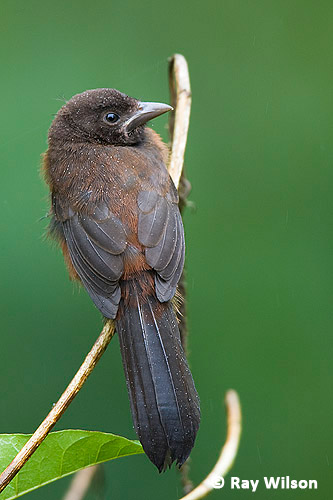 juvenile Silver-beaked Tanager |
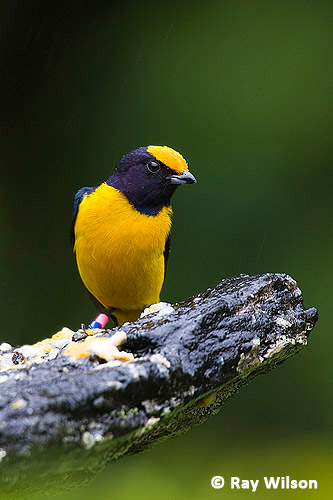
Orange-bellied Euphonia |
Very few other Tanagers came close enough for good photos, but I did manage to get a couple of the "Christmas Tree Ornament" varieties...
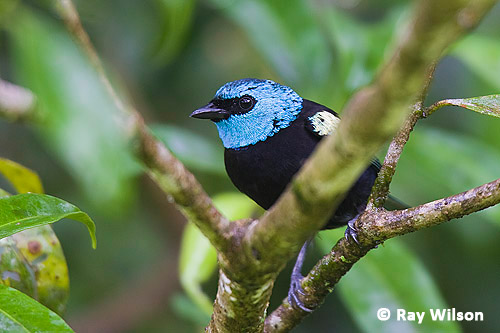
Blue-necked Tanager (Tangara cyanicollis)
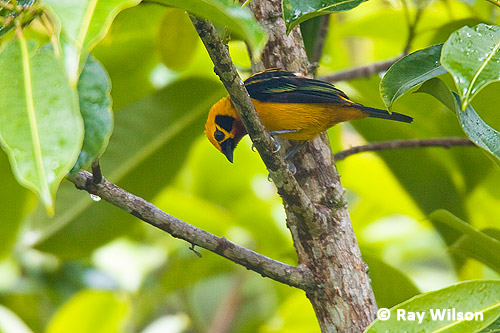
Golden Tanager (Tangara arthus)
Buff-throated Saltator was a regular visitor to the feeding tables. This one was looking a bit bedraggled in the rain.
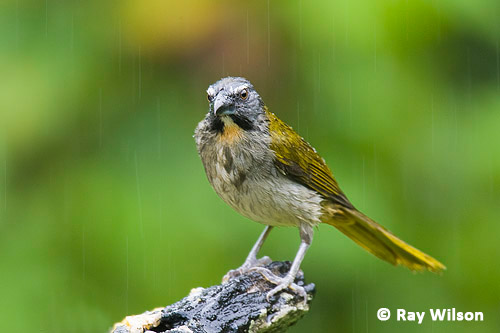
Buff-throated Saltator (Saltator maximus)
They particularly liked the squashed bananas...
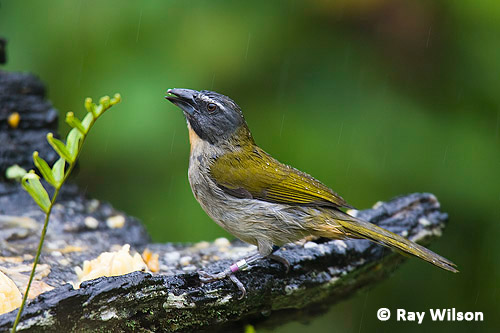
Buff-throated Saltator (Saltator maximus)
The squirrels also liked the bananas and sometimes even ventured up onto the balcony beside us.
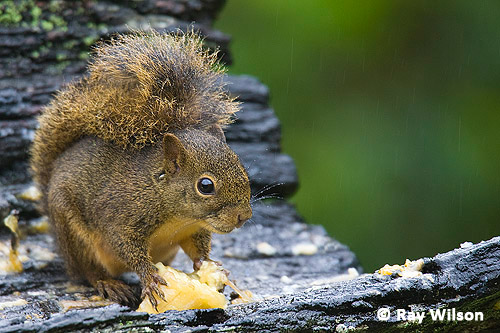
Northern Amazon Red Squirrel (Sciurus igniventris)
Agouti were much shier and nervous, running away at the slightest noise or movement. They are large rodents measuring up to 60cm (2ft) in length and weighing up to 4kg (9lbs). Note the cloud of mosquitoes hovering over its back...
Agouti (Dasyprocta [punctata] variegata)
Many of the birds around the Cock-of-the-Rock Lodge are colour-ringed by researchers for various studies. The unique colour combinations of their leg rings allow the researchers to differentiate individuals at a glance.
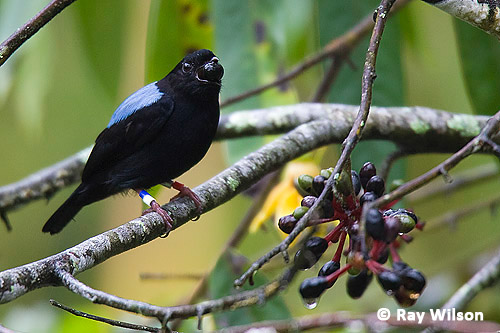
Yungas Manakin (Chiroxiphia boliviana)
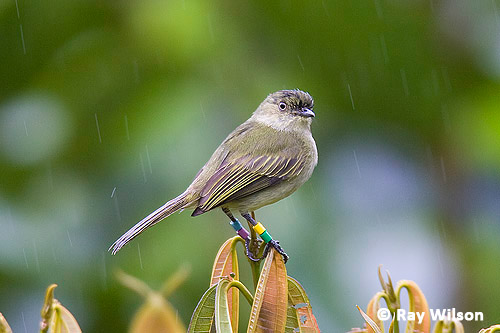
Bolivian Tyrannulet (Zimmerius bolivianus)
Swainson's Thrush are visitors from North America, spending their winter in the more hospitable climate of South American rainforests.
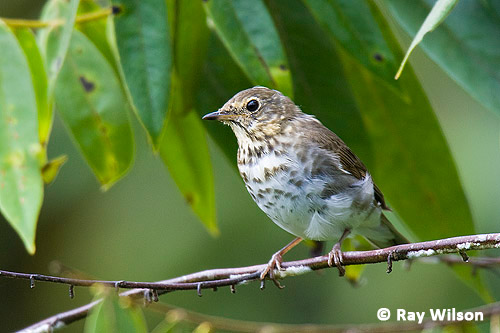
Swainson's Thrush (Catharus ustulatus)
Andean Guan belongs to a Neotropical family of pheasant-like birds. Like pheasants their meat is highly prized and in some areas the number of birds has been significantly reduced by over-hunting.
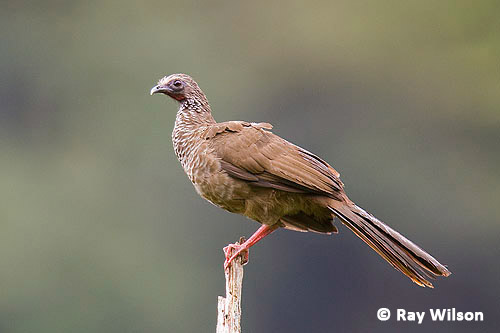
Andean Guan (Penelope montagnii)
The bird below gets its name from the long rictal bristles emerging from the base of its bill.
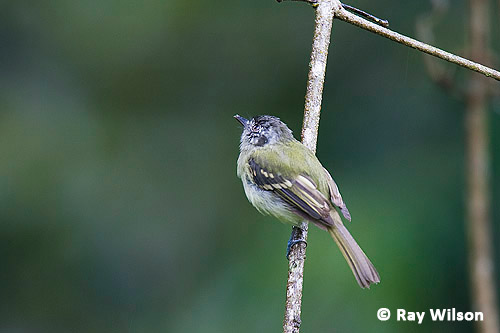
Marble-faced Bristle-Tyrant (Phylloscartes ophthalmicus)
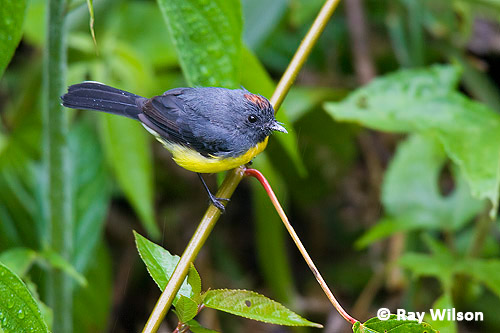
Slate-throated Redstart (Myioborus miniatus)
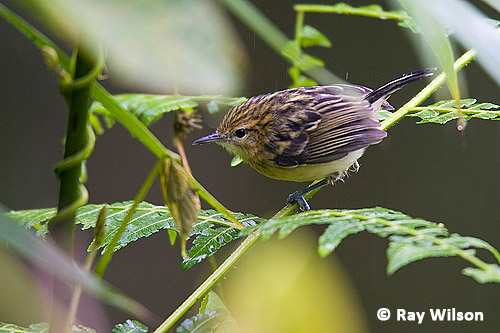
Stripe-chested Antwren (Myrmotherula longicauda)
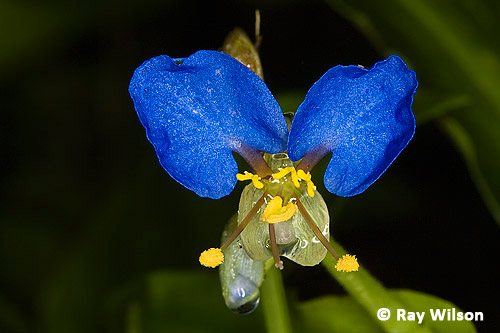
Spiderwort sp. (Commelinaceae)
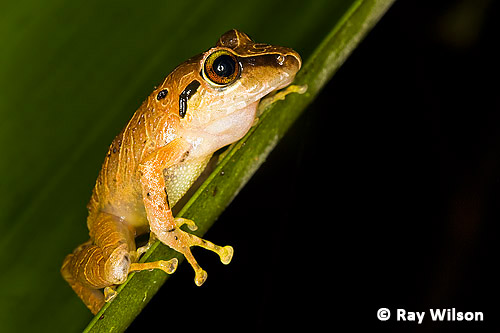
Treefrog
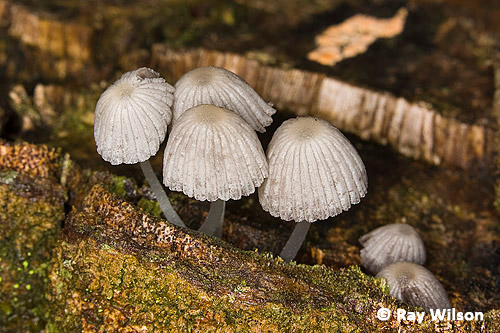
Fungi
Only a 5 minute walk from the lodge, right by the side of the road, you can view the displays of one of the iconic birds of the Andes: the spectacular Andean Cock-of-the-Rock.
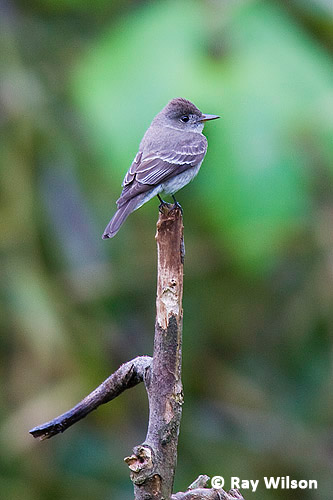 Eastern Wood-pewee |
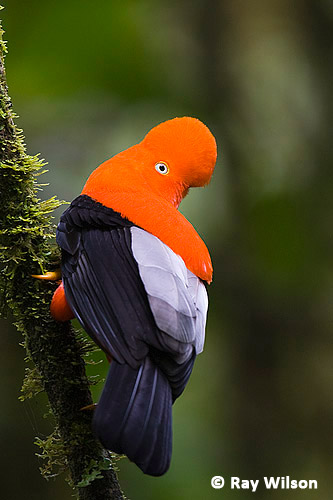
Andean Cock-of-the-Rock |
These pigeon-sized birds are polygamous and compete with each other in a communal lek for the right to display on the prime branch. Being able to display on this particular branch is extremely important for the males, as almost all of the females will chose to mate with the owner of the branch. After mating the males will take no further part the rearing of the young.
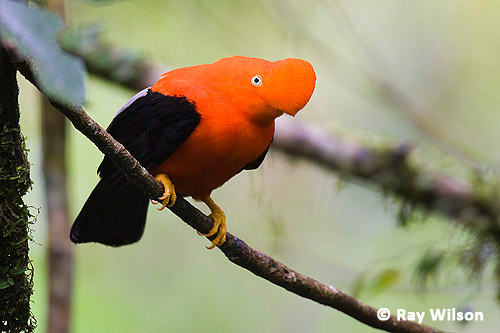
Andean Cock-of-the-Rock (Rupicola peruvianus saturatus)
Photography at the lek is very difficult as it is in the understorey of the forest and light levels are extremely low. The maximum shutter speed I was able to obtain was 1/25th of second!
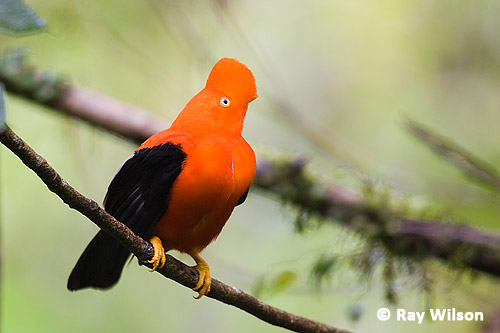
Andean Cock-of-the-Rock (Rupicola peruvianus saturatus)
Ray Wilson owns the copyright of all images on this site.
They may not be used or copied in any form without prior written permission.
raywilsonphotography@googlemail.com
